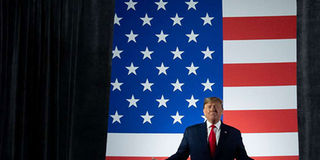The world holds its breath as Trump takes on the Ayatollah

US President Donald Trump arrives for a "Keep America Great" campaign rally at Huntington Center in Toledo, Ohio, on January 9, 2020. Few could miss Trump’s overall policy incoherence vis-à-vis Iran. PHOTO | SAUL LOEB | AFP
What you need to know:
- The US House of Representatives passed a resolution limiting the President’s powers to wage war against Iran without Congress’s consent.
- Following the Soleimani standoff, Iran announced its resumption of unfettered uranium enrichment.
Last week, the world let out a collective sigh of relief when a looming war between the US and its arch-foe Iran was stood down by both — just.
The assassination, on Donald Trump’s orders, of the commander of the elite Al-Quds (Jerusalem) Force of Iran’s Revolutionary Guards Corps, General Qasem Soleimani, had caused a huge global scare as the Islamic Republic vowed to exact “severe” vengeance.
True, immediately following their slain hero’s funeral, Iran retaliated with a barrage of missiles targeting two US military bases in Iraq.
The world held its breath. How would the unpredictable Trump react? The killing of Soleimani had been widely criticised even by US allies as reckless.
Here was a top representative of a recognised state entity who had been on an official mission to Baghdad. Sane statecraft demands you don’t assassinate such.
Yes, Soleimani had long rankled previous US administrations since he was the brains behind Iran’s extensive paramilitary network across the Middle East, mainly through proxy fighters ranged against American and Israeli forces.
FALSE RATIONALISATION
Still, Trump was berated for equating such a figure with ruthless terrorists such as Osama bin Laden.
Moreover, Soleimani had allied Iran with the US in the war to defeat the really nasty ISIS in Iraq and Syria.
Indeed, senators in Trump’s own Republican party who were given a confidential CIA briefing as to why Soleimani was assassinated spoke openly afterwards of having left the briefing unconvinced.
US congressmen and indeed the world remember other false rationalisations given in the past.
George W Bush famously lied about (non-existent) weapons of mass destruction to justify his tragic invasion of Iraq in 2003.
I don’t know what role Trump’s current impeachment problems played in the Soleimani affair. But such diversionary tactics have been tried before.
In the heat of Bill Clinton’s impeachment proceedings in 1998, he cynically ordered airstrikes against the same Iraq on the excuse that Saddam Hussein was blocking weapons inspections.
MISSILE ATTACK
By some miracle, Trump chose not to respond to the Iranian missile bombardment with an American counterattack whose ripple effects would have spiralled far beyond Iran and the Middle East.
Did somebody step in to urge calm? Perhaps the frightened Persian Gulf States? Or an EU power? Nobody knows for sure.
What is clear is that neither Iran nor the US wanted to escalate matters beyond this point — for now.
Iran may indeed have deliberately sought to ensure the missiles would not cause serious human casualties. America is a superpower.
Iran, despite her bluster, is not suicidal. The Iran missile strike was necessary to assuage domestic outrage at Soleimani’s murder.
The Americans seemed to understand that. Clearly, no side was eager for a full-scale war.
Much as the US has overwhelming military firepower, it knows that Iran in her own way has the capacity to trigger mayhem across the entire Middle East, where Iranian-backed militias like Hezbollah in Lebanon, the Houthis in Yemen and other like-minded Shia groups in Syria and Iraq can cause tremendous havoc.
ASYMMETRICAL CONFLICT
Apart from the sheer destruction and loss of lives, the chaos would choke the supply of Persian Gulf oil and cause prices to skyrocket, leading to an almost certain meltdown of the global economy.
Nobody has any illusions the crisis is over, though. During a memorial for Soleimani in Tehran, Iran’s Supreme Leader Ayatollah Ali Khamenei described the missile attack as a mere “slap in the face” at the US, implying more was to come, the ultimate goal being the total removal of US troops from the region.
Indeed, Iraqi Prime Minister Adel Mahdi, who belongs to the Iraqi Shia majority — the co-religionists of the Iranians — demanded US soldiers stationed in the country pack up and leave.
Rockets were soon being fired by Iraqi Shia militiamen at Baghdad’s “Green Zone” compound where the US embassy and other key Western installations are barricaded.
The region may as well have entered a new phase of “asymmetrical conflict”, where a country uses surrogates to wage a war of attrition against an enemy.
CONGRESS'S APPROVAL
Iranian proxies in the Arabian peninsula and in Syria, Lebanon, Iraq, Afghanistan and even Pakistan will need little prompting from Tehran to take the battle to American forces using all available means, conventional and unconventional.
Everybody was fidgety. Germany and Canada took the precaution of relocating their soldiers based in Iraq. Israel on her part dissociated herself from the Soleimani assassination.
Ever wary of Trump’s temperament, the US House of Representatives passed a resolution limiting the President’s powers to wage war against Iran without Congress’s consent.
Anyway, few could miss Trump’s overall policy incoherence vis-à-vis Iran.
In May 2018, the president petulantly tore up a nuclear treaty which Barack Obama negotiated with Iran and which was guaranteed by Russia, China, Britain, France and Germany.
Following the Soleimani standoff, Iran announced its resumption of unfettered uranium enrichment. Who knows, the next round of US-vs-Iran confrontation may very well occur when Iran has a nuclear bomb.





